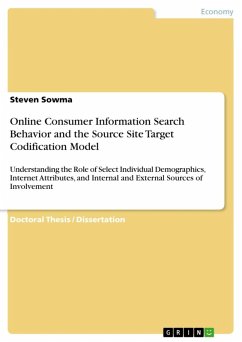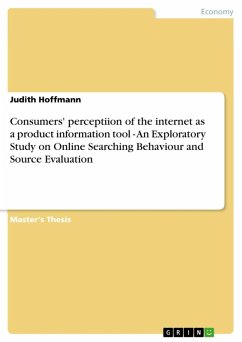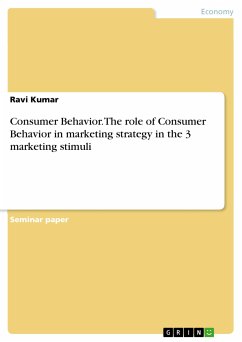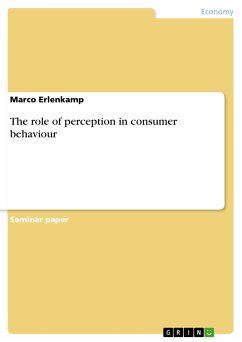Doctoral Thesis / Dissertation from the year 2009 in the subject Business economics - Offline Marketing and Online Marketing, Union Institute & University, course: Consumer-Web Behavior, Online Search Behavior, Online Cognition, Online Marketing, language: English, abstract: Despite the prevalent use of the Web for consumer information searches, very little is known about this behavior or the influences that individual and contextual factors may have on it. Moreover, no methodology exists for comprehensively measuring the complex array of behaviors that occur during a consumer Web session. Accordingly, a lab experiment, a contrived online product search-and-purchase task, was used to determine how these factors influence search behavior and purchase outcomes. Purchase contexts were manipulated by variations in task instructions. A survey was used to measure individual traits. A newly proposed measurement schema, the Source Site Target codification model, was used to quantify session-wide Web behaviors-leading to a variety of original findings. Contrary to past research, education was a non-factor and women outperformed men across online search behaviors. Age was negatively associated with consumer Web searches. Contrastingly, Web experience and search skill were positively associated with consumer Web searches, whereas purchase experience was negatively associated with consumer Web searches. Individual and contextual derivations of involvement (motivation) influenced not only the extent of a given Web search, but the nature of the search as well. Surprisingly, although individual and situational factors significantly and sometimes dramatically impacted consumer Web behaviors, changes in behavior were not associated with purchase performance. While the Web is adaptable to a variety of users, it is not a "perfectly efficient" medium. Individuals were susceptible to making sub-optimal purchase decisions regardless of individual traits or contexts. Key Words: Consumer Web Behavior, Web Research Methods, Online Consumer Searches, Online Purchases, Demographics, Involvement, and the Need for Cognition.
Dieser Download kann aus rechtlichen Gründen nur mit Rechnungsadresse in A, B, BG, CY, CZ, D, DK, EW, E, FIN, F, GR, HR, H, IRL, I, LT, L, LR, M, NL, PL, P, R, S, SLO, SK ausgeliefert werden.









